
The Cure are an English rock band formed in 1978 in Crawley, West Sussex. Throughout numerous lineup changes since the band's formation, guitarist, lead vocalist, and songwriter Robert Smith has remained the only constant member, though bassist Simon Gallup has been present for all but about three years of the band's history. Their debut album, Three Imaginary Boys (1979), along with several early singles, placed the band at the forefront of the emerging post-punk and new wave movements that had sprung up in the United Kingdom. Beginning with their second album, Seventeen Seconds (1980), the band adopted a new, increasingly dark and tormented style, which, together with Smith's stage look, had a strong influence on the emerging genre of gothic rock as well as the goth subculture that eventually formed around the genre.
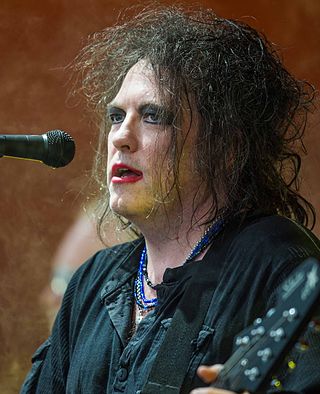
Robert James Smith is an English musician, singer, songwriter, record producer, and the co-founder, lead vocalist, guitarist, primary songwriter, and only continuous member of the Cure, an alternative rock band formed in 1978. His unique guitar-playing style, distinctive singing voice, and fashion sense, often sporting a pale complexion, smeared red lipstick, black eye-liner, unkempt wiry black hair, and all-black clothes, which were highly influential on the goth subculture that rose to prominence in the 1980s.
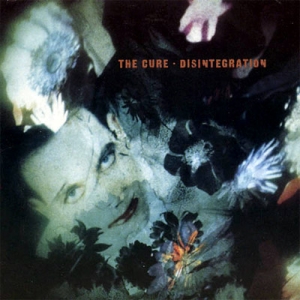
Disintegration is the eighth studio album by English rock band the Cure, released on 2 May 1989 by Fiction Records. The band recorded the album at Hookend Recording Studios in Checkendon, Oxfordshire, with co-producer David M. Allen from late 1988 to early 1989.

Kiss Me, Kiss Me, Kiss Me is the seventh studio album by English rock band the Cure, released on 26 May 1987 by Fiction Records. The album was recorded at Studio Miraval in Correns, France.

Japanese Whispers is the second compilation album by British group The Cure. It was released in late 1983 by Fiction Records. The title is a pun on the children's game Chinese whispers.

The Top is the fifth studio album by English rock band the Cure, released on 4 May 1984 by Fiction Records. The album entered the UK Albums Chart at number ten on 12 May. Shortly after its release, the Cure embarked on a major tour of the United Kingdom, culminating in a three-night residency at the Hammersmith Odeon in London.

The Head on the Door is the sixth studio album by English rock band the Cure. It was released on 30 August 1985 by Fiction Records. Preceded by the single "In Between Days" which had reached No. 15 on the UK Singles Chart, The Head on the Door was described by Melody Maker as "a collection of pop songs". With its variety of styles, it allowed the group to reach a wider audience in both Europe and North America. In the United Kingdom it became their most successful album to date, entering the albums chart at No. 7 on 7 September.

Concert: The Cure Live is the first live album by English rock band the Cure. It was recorded in 1984 at the Hammersmith Odeon in London and in Oxford during The Top tour. The cassette tape edition featured, on the B-side, a twin album of anomalies, titled Curiosity : Cure Anomalies 1977–1984.

The Cure in Orange is a concert film by British rock group The Cure. It was shot on 35mm film at the Théâtre antique d'Orange in the French countryside, on 8, 9, and 10 August 1986. Band members Robert Smith, Simon Gallup, Porl Thompson, Boris Williams (Drums), and Lol Tolhurst (Keyboards) make their way through 23 songs, under the direction of Tim Pope.
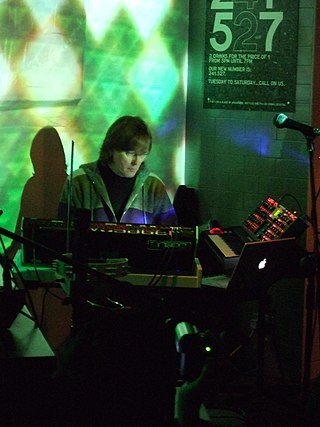
Roger O'Donnell is an English keyboardist best known as a longtime member of The Cure, which he first joined in 1987 and for which he has served three different tenures. O'Donnell has also performed as a touring and session keyboardist for many artists and maintains an active solo career.
Michael Stephen Dempsey is an English musician, best known as the bassist for The Cure and The Associates.
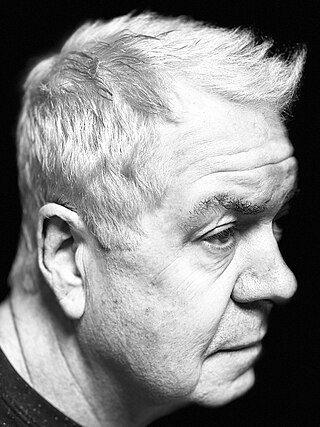
Laurence Andrew Tolhurst, known professionally as Lol Tolhurst, is an English musician, songwriter, producer, and author. He was a founding member of The Cure, for which he first played drums before switching to keyboards. He left the Cure in 1989 and later formed the bands Presence and Levinhurst. He has also published two books and developed the Curious Creatures podcast. This has led him to collaborate with Budgie and Jacknife Lee and the release of an album, Los Angeles (2023).

"Let's Go to Bed" is a song by English rock band the Cure, released as a stand-alone single by Fiction Records in November 1982. In the aftermath of the dark Pornography, Robert Smith returned from a month-long detox in the Lake District to write the song, the antithesis to what the Cure currently represented. It was later included on the album Japanese Whispers, which compiles the band's three singles from 1982 to 1983 and their five B-sides.

"The Walk" is a song by English rock band The Cure, released as a stand-alone single in June 1983. It later appeared on the compilation album Japanese Whispers. It was recorded when the band was briefly reduced to the two founder members Robert Smith and Lol Tolhurst upon the departure of bassist Simon Gallup in mid-1982, following the end of the band's tour in support of the album Pornography. According to Tolhurst, they chose Steve Nye as producer at the time due to his work on the album Tin Drum by Japan. Tolhurst later commented: "It was the first time we had worked with a 'proper' producer, as opposed to doing production with an engineer that we really liked. […] He was able to make electronic instruments sound more natural, and that's what we wanted."
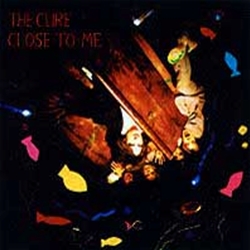
"Close to Me" is a song by English rock band the Cure, released in September 1985 as the second and final single from their sixth album, The Head on the Door.

"Why Can't I Be You?" is a song by the English rock band the Cure, released as the lead single on the 6 April 1987 from their album Kiss Me, Kiss Me, Kiss Me.

"Hot Hot Hot!!!" is a single by British rock band the Cure released on 8 February 1988. It is taken from their 1987 album Kiss Me, Kiss Me, Kiss Me. The song reached number 45 in the UK, whereas it was more successful in Ireland where it reached number 18, and in Spain where it reached the Top 10.

The Cure: Trilogy is a double live album video by the Cure, released on two double layer DVD-9 discs, and later on a single Blu-ray disc. It documents The Trilogy Concerts, in which the three albums, Pornography (1982), Disintegration (1989) and Bloodflowers (2000) were played live in their entirety one after the other each night, the songs being played in the order in which they appeared on the albums. Trilogy was recorded on two consecutive nights, 11–12 November 2002, at the Tempodrom arena in Berlin. A third, previous Trilogy concert in Brussels on 7 November was not used.
The Cure: "Reflections" refers to a set of shows in which The Cure played their first three albums Three Imaginary Boys, Seventeen Seconds and Faith in full at the VividLive festival at the Sydney Opera House on 31 May and 1 June 2011. All three albums were played in their entirety on both nights, along with several other tracks from the same era.

















